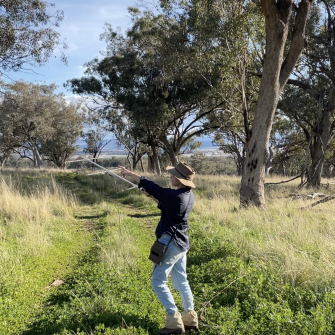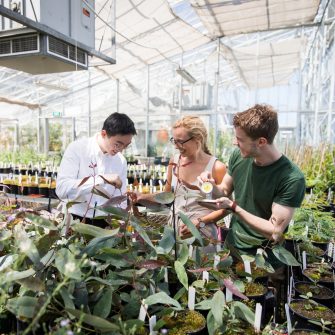Bachelor of Advanced Science (Honours)/Arts
- Commencing Terms
- Term 1, 2 & 3
- Duration
- 5 Year(s)
- Delivery Mode
- Face-to-face (includes blended)
- Campus
-
Kensington
- Codes
- UAC code 429370
- Program code 3948
- CRICOS code 088877G
-
ATAR/2025 lowest selection rank
- 93.0 View all admission criteria
-
2026 Indicative first year full fee
- $11,000*
-
2026 Indicative full fee to complete degree
- $58,500*
-
2026 Indicative first year full fee
- $55,000*
-
2026 Indicative full fee to complete degree
- $301,500*

Application closures for 2026
International applications for all undergraduate programs, as well as postgraduate programs offered by the faculties of Arts, Design & Architecture, Engineering (excluding Master of Information Technology and associated programs) and Science are now closed to New Overseas Student Commencement (NOSC) for 2026 intakes.
Postgraduate programs offered by the Business School and the faculties of Law & Justice and Medicine & Health remain open. Master of Information Technology (and associated programs) also remain open.
- Overview
- Entry requirements
- What will I study?
- Future careers
- How to apply
- Fees & Scholarships
Overview
The world needs critical and creative thinkers to solve the problems of tomorrow, so why not hone both talents with a unique double degree? Advanced Science (Honours)/Arts gives you the chance to fuse your analytical and creative sides to develop an adaptable, future-focused skill set.
From earth science to psychology, mathematics to biotech, our advanced-level science degree will prepare you for a wide range of careers. No matter which of the 24 specialisations you choose, you’ll gain in-demand transferable skills that can be applied to almost any industry.
In your arts degree, you can explore humanities, creative arts, social sciences, languages or business. You’ll develop a broader understanding of the world at a university that nurtures your passions, purpose and potential.
Key features
- Nurture your passions
At UNSW, you’ll be supported to build an engaging degree around your interests. By combining Advanced Science (Honours) and Arts, you’ll be free to explore subjects and specialisations that resonate and align with your career aspirations.
Whether your mind is already made up or you’re still developing your focus areas, we’ll help you build the degree that’s right for you.
- Be empowered to lead your learning with SciConnect
SciConnect is an innovative online system that's integrated across your whole science degree. It will be there to help you settle into university, track your professional development and showcase your skills to future employers. The platform focuses on connecting you with four key areas to help you get the most out of your student experience including orientation, co-curricular opportunities and communities, career development and a graduate portfolio.
SciConnect enables you to shape your university experience and supports you in showcasing your talents to potential employers with a comprehensive impression of who you are, beyond your academic transcript.
Multiply your opportunities
Employers are seeking adaptable graduates who can work seamlessly across interdisciplinary teams and contexts. Gaining experience across two distinct study areas will be highly regarded as you enter the job market.
Gain real-world experience
UNSW takes a career-ready approach to learning, which is why many of our programs include Work Integrated Learning (WIL) and Research Integrated Learning (RIL) opportunities. These experiences give you the opportunity to apply your skills in a professional context and learn alongside world-leading academics.
Why study at UNSW?
-
As a global top 20 university (QS World University Rankings, 2024–2026), we’re guiding the future leaders of science and art in Australia and overseas.
UNSW Science is ranked in the global top 50 for nine subjects (QS World University Rankings by Subject, 2025).
- Ranked =#32 globally for psychology
- Ranked #44 globally for natural sciences
- Ranked =#49 globally for chemistry
- Ranked =#37 globally for earth and marine sciences
- Ranked #38 globally for environmental sciences
- Ranked =#28 globally for geology
- Ranked #31 globally for geophysics
- Ranked #48 globally for mathematics
- Ranked #27 globally for materials science
-
At UNSW, we’re focused on the full picture. We’re here to support your personal and professional development through a tailored degree that aligns with your career goals. No matter which specialisation or pathway you follow, you’ll have access to dozens of professional development opportunities and be able to leverage our 400+ industry connections and research partners to start building your own professional network.
-
At UNSW, you’ll join a diverse global community that’s working together to shape a better future. You’ll build up your professional identity through SciConnect – an innovative online system that is integrated into your Advanced Science degree. With a range of clubs and societies, programs such as Women in STEM and international exchange opportunities, you’ll gain invaluable experiences at UNSW that extend far beyond the classroom.
Want to see more from UNSW Science?
Entry requirements
-
- The 2025 Lowest Selection Rank (LSR) is the adjusted rank (ATAR plus adjustment factors) you would have needed to gain entry to this degree in 2025.
- The 2025 A levels score is based on four Advanced Level (A2) subjects. Entry scores are calculated from the best three or four A2 subjects (excluding repeated subjects) using the following values: A*=6, A=5, B=4, C=3, D=2, E=1. At most one Applied A Level subject may be included in the best four subjects used to calculate the aggregate.
- The 2025 IB Diploma is an indication of the IB you would have needed to gain entry to this degree in 2025. It is to be used as a guide only.
- The 2025 Lowest ATAR is the lowest ATAR (before adjustment factors were applied) to which an offer was made. Where <5 is listed, this indicates that less than 5 ATAR-based offers were made and so the score has not been published. N/A indicates no offers were made on the basis of ATAR.
*The Lowest ATAR to which an offer was made, for this program, is based on a UNSW Gateway Early Conditional Offer.
-
At UNSW, we are committed to ensuring prospective students have all the information they need in order to make informed decisions about their study options.
To assist you in gaining a better understanding of how Admissions works at UNSW, we have provided you with a summary of ATAR offers and the student profile.
We hope this information will help you identify the degree that is right for you.
Assumed knowledge
For Advanced Science (Hons) component: Mathematics Advanced or Mathematics Extension 1 (depending on chosen area of study) plus one or more of Biology, Chemistry, Earth and Environmental Science, Physics. For Arts component: None
Adjustment Factors
We offer a range of adjustment factor schemes that reward students for academic performance and extra-curricular achievements. These schemes also take into account a range of personal and educational disadvantages that may have affected your studies.
HSC Plus
This scheme rewards students who perform well in Year 12 subjects that are relevant to their preferred UNSW degree. You may be awarded up to five points.
Elite Athletes, Performers and Leaders (EAPL)
This program recognises achievements in the areas of sport, academia, leadership and music at an elite level. You may be eligible for up to five points.
Educational Access Scheme (EAS)
Factors such as illness, financial hardship, language difficulties or attending a particular school can mean you don't always get the best possible marks in Years 11 and 12. If one of these situations applies to you, submit an application for the Educational Access Scheme (EAS) via UAC. Eligible students can receive between 1 and 10 points towards their chosen UNSW degree.
Admission pathways
Your ATAR is not the only measure of your potential to succeed, which is why we offer a range of pathways into university. Explore your options below and get in touch with our Future Student Advisers to discuss your path to UNSW.
Gateway Admission Pathway
This scheme is open to students who attend Gateway schools, live in a low-socioeconomic area based on IRSAD and IEO indexes of SEIFA criteria, or are an Aboriginal and Torres Strait Islander person. It adjusts the ATAR requirements for your preferred UNSW degree and provides early offers and early conditional offers to UNSW.
Entry programs for Australian Aboriginal and Torres Strait Islander people
We offer entry programs for Indigenous Australians, including the Indigenous Preparatory Programs and the Indigenous Admission Scheme (IAS). The entry pathway program you apply for will depend on the degree you want to study.
Progression requirements
Entry into the Honours program in Science is subject to academic performance and progression requirements. Students may exit the Advanced Science (Honours) program with a B Science award if they are unsuccessful in applying for entry into Honours.
English language requirements
You may be asked to provide evidence of your English proficiency to study at UNSW depending on your educational background and citizenship. English language skills are vitally important for coping with lectures, tutorials, assignments and examinations - this is why UNSW requires a minimum English language competency for enrolment.
If you’re completing an Australian Year 12 qualification (e.g. NSW HSC or equivalent), you do not need to provide anything extra to prove your proficiency. Your qualification will be used as evidence of your English proficiency.
If you do need to provide evidence of your English proficiency, this will be indicated in your application. You can prove this by providing evidence that you meet one or more of the following criteria:
- English language tests and university English courses
- Prior study in the medium of English
- Other qualifications
If you need to improve your English skills before you start your degree, UNSW College’s Academic English Programs are for you. The programs are suitable for various English levels and help you prepare for university studies and life in Australia.
For more details, visit the English Language Requirements page.
International direct entry
Information for applicants with CBSE, HKDSE or Singapore A Levels Qualification
Calculating your CBSE Score:
Awarded by CBSE, average percentage marks across English or Hindi, and your best four remaining subjects. Where marks are given as a range, the mid-point for that range is used e.g. 75 to 80 = 77.5.
Calculating your HKDSE Score:
Entry requirements are based on the aggregate of the best 5 achieved category A subjects (category B and C subjects are not considered).
For subjects other than Citizenship and Social Development: level 5**=7 points, level 5*=6 points, level 5=5 points, level 4=4 points, level 3=3 points, level 2=2 points, level 1=1 point, Level U=0 point.
For subject Citizenship and Social Development: Attained=2 points, Unattained=0 point. Citizenship and Social Development will only be counted towards the aggregate if the 2 points awarded for Attained ranks among the student’s best five scoring subjects.
If Mathematics Compulsory Part and Extended Part (Module 1 or 2) are both presented, both scores can be counted.
Calculating your Singapore A Levels:
Due to significant changes to the GCE A-Level Curriculum and University Admissions Score (UAS) calculation effective 2026, UNSW assessment is currently under review.
Note: Entry requirements published on this page are correct as of the day of publication and may change without notice.
We do not accept secondary qualifications from this country. We may accept tertiary study results, please contact us for more information.
Please contact us for direct entry requirements.
Admission pathways
If you do not meet the requirements for direct entry into your chosen degree, you may be eligible for a pathway program with UNSW College. UNSW College provides alternative entry options using university-approved content so that you can start your UNSW journey with confidence.
Progression requirements
Entry into the Honours program in Science is subject to academic performance and progression requirements. Students may exit the Advanced Science (Honours) program with a B Science award if they are unsuccessful in applying for entry into Honours.
English language requirements
You may be asked to provide evidence of your English proficiency to study at UNSW depending on whether you are from an English-speaking background or non-English speaking background. English language skills are vitally important for coping with lectures, tutorials, assignments and examinations - this is why UNSW requires a minimum English language competency for enrolment.
If English is not your first language, you’ll need to provide proof of your English proficiency before you can be given an offer to study at UNSW. You can do this by providing evidence that you meet one or more of the following criteria:
- English language tests and university English courses
- Prior study in the medium of English
- Other qualifications
If you need to improve your English skills before you start your degree, UNSW College’s Academic English Programs are for you. The programs are suitable for various English levels and help you prepare for university studies and life in Australia.
For more details, visit the English Language Requirements page.
Check the specific English language requirements for this program
What will I study?
UNSW is introducing a new academic calendar from 2028.
We are moving to a new flex-semester calendar. What does this mean for your studies?
Program structure
The Bachelor of Advanced Science (Honours)/Bachelor of Arts is a double degree that you can complete in five years with full-time study. You’ll complete a minimum of 240 units of credit (UOC) through a combination of majors, minors and electives.
Full program structure
Your double degree consists of:
144 units of credit from Advanced Science (Honours), including:
- Two core research skills courses
- One Science major
- An optional minor
- One Science Honours specialisation
- Science elective courses (if required)
96 units of credit from Arts, including:
- One major
- One minor
- Prescribed electives (if required)
OR - One major
- A second major
Majors
-
Choose from 25 majors with the Bachelor of Advanced Science (Honours):
Advanced Physical Oceanography
Advanced Physical Oceanography explores physical conditions, processes and interactions in the ocean.Advanced Physics
Explores the laws of nature that govern the behaviour of the universe, from the smallest sub-atomic particles to the universe itself.Anatomy
Study the structure of the human body.Bioinformatics
Bioinformatics integrates computer science and statistics to analyse genetic information in molecular biology.Biology & Biodiversity
Study life science and explore how organisms function, grow, evolve and relate to their environment.Biophysics
Biophysics unlocks how life works by applying physics and mathematics to reveal the mechanisms behind health and disease in complex biological systems.Biotechnology
Biotechnology explores biological processes for producing food, industrial chemicals and pharmaceuticals.Chemistry
Explore chemistry, from sub-atomic particles to spectacular phenomena, the field offers vast opportunities.Climate Systems Science
Gain an understanding of the Earth's Climate System, focusing on areas such as climate change and risks.Earth Science
Earth science investigates our planet’s nature, evolution and powerful forces.Ecology and Conservation
Explore how various organisms interact with one another and their environment.Genetics
Genetics studies fundamental genes that influence every characteristic in humans and other species.Geography
Explore Earth’s landscapes, and environments to understand how they function and change over time.Immunology
Unlock better treatments and prevention strategies for immune-related illnesses.Marine and Coastal Science
Explore marine and coastal science, that looks at all aspects of the marine environment encompassing many sciences from biology to geology.Materials Science
Materials science is the specialised study of creating high-performance materials from metals, ceramics, polymers and composites for society.Mathematics
Mathematics is the science of patterns and underpins all corners of science and technologyMicrobiology
Microbiology studies tiny life forms like bacteria, viruses, fungi and protozoa.Molecular and Cell Biology
Study cell biology, which explores molecular structures, cellular processes, and their roles in function, reproduction and development.Neuroscience
Neuroscience aims to understand the nervous system’s biological and behavioural aspects, as well as to treat diseases like schizophrenia and Alzheimer’s.Pathology
Pathology involves studying diseases at genetic, molecular, cellular and organ levels. Contrary to popular belief, it’s not solely about blood tests.Pharmacology
Discover the effect that drugs have on living tissues and the normal body functions of humans and animals.Physiology
Physiology studies how the human body functions, including organ processes, growth, maintenance and responses during disease and ageing.Psychology
Psychology studies behaviour, mental processes, brain-behaviour relationships, perception, learning, memory and social interactions.Statistics
Statistics is the science of collecting, analysing, presenting and interpreting data. -
Asian studies
Discover our closest neighbours' impact on the world and understand Australia's place within the Asian region.Chinese studies
Explore China’s rich cultural heritage, history and society to gain a competitive edge in the global job market.Criminology
Experience an approach beyond lectures that sees you visiting courts and prisons and hearing first-hand from the people in the justice system.Creative writing
Learn from award-winning writers, join writing masterclasses and events, and create invaluable industry connections.English
Delve into memorable stories, poetic patterns, ringing phrases and imaginative landscapes.Environmental humanities
Immerse yourself in the social, cultural and political factors shaping human relations with the natural world.European studies
Delve into the intellectual history, politics, religion and movement of minority peoples throughout history.Film studies
Tell stories, share human experiences, document reality and expand horizons as an experimental art form.French studies
Learn about the key language for the arts, cuisine, technology, justice and health.Geographical studies
Discover how we can plan for a better future by combining classroom study with hands-on experience in the field.German studies
Develop practical language skills and explore Germany’s fascinating culture, diverse society and complex history.Global development
Learn the many ways we can create practical and positive change at local, national, and global levels.History
Discover a uniquely global perspective taught by passionate, world-class historians.Indigenous studies
Explore the current and traditional Indigenous knowledge, philosophies, and cultural values tied to country.Japanese studies
Learn to communicate in Japanese and explore the rich tapestry of Japan’s culture, history and society.Korean studies
Explore the rich social, cultural and historical context that shapes Korea today.Linguistics
Understand how language policy impacts multilingual and multicultural communities in Australia and around the world.Media, culture and technology
Explore the history, legacy and ongoing impact of media through the 20th and 21st centuries across an ever-changing tech landscape.Music studies
Discover how music can be an expression that defines cultures, societies and as an expression of yourself.Philosophy
Learn how to communicate complicated ideas by thinking clearly, deeply, analytically, and creatively.Politics and international relations
Pave your way for careers in government and business, lead with difference and change the world.Sociology
Join Australia’s oldest sociology department and discover insights from diverse cultures and the lived human experience.Spanish studies
Explore literature, film and art and discover the history and the contemporary cultural context of the Spanish-speaking world.Studies in psychology
Explore the drivers of human behaviour and causes of psychological disorders through investigating the way we interact, learn and ability to cope with pressure.Theatre and performance studies
Learn from industry professionals, collaborate with artists, and gain practical experience with production companies, venues and publishers. -
You can complete a minor in the study areas listed above, as well as:
Future careers
Studying Advanced Science and Arts as a dual degree at UNSW will open up a wide range of career opportunities upon graduation. You’ll gain transferable skills that can be applied across industries and functions with proficiency in logical, analytical and creative thinking.
Explore the range of potential career paths available across the fields of science and arts.
Potential careers
-
- Academic
- Activist
- Actor
- Advocate
- Biologist
- Biotechnologist
- Climate scientist
- Clinical coder
- Consultant
- Content producer
- Data scientist
- Diplomat
- Environmental scientist
- Food scientist
- Gallery manager
- Genetic counsellor
- Geologist
- Government administrator
- International representative
- Journalist
- Laboratory technician
- Marine biologist
- Materials scientist
- Mathematician
- Media consultant
- Medical technician
- Museum manager
- Neuroscientist
- Office administrator
- Pharmacologist
- Policy consultant
- Political strategist
- Politician
- Product developer
- Psychologist
- Public servant
- Publisher
- Researcher
- Science writer
- Set manager
- Social media producer
How to apply
Applications for undergraduate study from domestic students (Australian citizens, Australian permanent residents, Australian permanent humanitarian visa holders and New Zealand citizens) are processed by the Universities Admissions Centre (UAC).
Visit the Apply section of the UAC website and you can nominate up to five degrees in order of preference, with the first being your most desired degree and university.
On-time applications for admission usually close at the end of September each year for Term 1 admission. Late applications can be submitted, but a late fee will apply. For study starting in Term 1, the majority of offers are made in December and January. Visit the UAC website for key dates for admission outside of Term 1.
Ready to start your application?
For most international students, applications are submitted via our Apply Online service. We encourage you to submit your completed application as early as possible to ensure it will be processed in time for your preferred term.
Some high-demand programs with limited places, may have an earlier application deadline or may have an earlier commencement date. For details, visit the international admissions information page.
*If you are an international student studying an Australian qualification, go to the Universities Admission Centre (UAC) for application and UAC key dates. Note: If you are under 18 years of age, you need to make special arrangements. For details, visit the under 18 international students page.
Ready to start your application?
Fees & Scholarships
Commonwealth Supported Place multiple Student Contribution Bands may apply for this double degree. See single degrees for the applicable fee bands.* The student contribution for a Commonwealth Supported Place is an indication only of the amount payable in Year 1 based on a standard full-time load of 48 credit points (1.0 EFTSL). The actual student contribution you will be liable for depends on your individual program of study and the calendar year in which you enrol. Actual fees are calculated upon enrolment. Student contribution amounts are subject to annual review by the University and may increase each year during your studies (subject to caps determined by the Australian Government), effective at the start of each calendar year. The indicative fees listed here are based on an estimated average and are for tuition only other fees and charges are not included.
*Fees are subject to annual review by the University and may increase annually, with the new fees effective from the start of each calendar year. The indicative fees listed here are based on an estimated average and are for tuition only, other fees and charges are not included. The amount you pay will vary depending on the calendar year to enrol, the courses you select and whether your study load is more or less than 1 Equivalent Full Time Student Load (8 courses per year).
Indicative fees are a guide for comparison only based on current conditions and available data. You should not rely on indicative fees. More information on fees can be found at the UNSW fees website.
Indicative fees to complete the program have been calculated based on a percentage increase for every year of the program. Fee increases are assessed annually and may exceed the indicative figures listed here.
Indicative fees to complete the program include tuition plus an estimate of study-related costs of approximately $1,000 per year. To find out more about other costs, visit UNSW International.
Scholarships
At UNSW, we award over $83 million in scholarships each year. We pride ourselves on rewarding excellence and making university accessible to students from all walks of life. Whether you’re a domestic or international student, our range of scholarships, prizes and awards can support your journey.
Progress starts here – at a world-leading university

Top 20 Worldwide
Ranked in the global top 20 for three consecutive years
QS World University Rankings, 2024–2026

Winner of the AFR Most Employable University Award six years in a row
AFR Top100 Future Leaders Awards, 2020–2025

Australia's #1 for Innovation
Highest number of startups and spinouts from university-developed tech
SCOPR report, 2024






